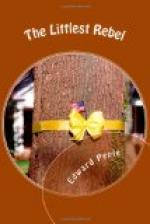An officer he was, erect in his saddle, chin up and shoulders squared. On his shoulders his straps had been replaced, and his saber rattled against his thigh to the rise and fall of his horse’s stride.
Straight on he came till he checked his mount before the center of the waiting line, and the troopers knew that Lieutenant-Colonel Morrison had once more come into his own.
Their sabers rasped from out the scabbards and rose in a joyous, swift salute, while Morrison’s once dishonored sword acknowledged it.
“’Tention ..._company!_”
The long line stiffened and waited for their officer to speak; yet the voice was not the voice of an officer in command, but that of a comrade and a friend.
“Thank you, boys! It’s good to be back again.” He swallowed something in his throat and struggled manfully to speak in even tones. “I must ask you to be quiet—and not to—”
He stopped. Again his troop had disobeyed him—disobeyed him to a man. A shout went up, deep, joyous and uncontrolled, its echoes pulsing out across the hot, red fields till it reached the distant camp; and Grant looked up from a war map’s crisscross lines, grunted, and lit a fresh cigar.
And Lieutenant-Colonel Morrison sat his horse before his cheering line of men, silent, happy, while two tears rolled, unheeded, down his cheek—a soldier and a man!
His tenderness to a little child had torn him from his saddle and doomed him to disgrace and death; and then, one line from her baby lips had mounted him again and set him before his troopers on parade.
“It was when ... Daddy came through the woods ... and put my mamma ... in the ground.”
Two lives she had held—in her little hands—and had saved them both with a dozen words of simple, unfaltering truth.
* * * * *
On the dusty pike which led to Virginia’s capital another rider plodded through the heat and haze. His coat, once gray, now hung in mud-stained tatters about his form, but beneath his battered campaign hat his thin, pale features were smoothed by a smile of happiness.
Behind his saddle, one hand gripped tightly in a rent in the soiled gray coat, sat still another Rebel—the smallest of them all—her tiny legs stretched out almost straight on the horse’s wide, fat back.
“Daddy—how far is it to Richmon’ now?”
The rider turned his head and pointed north.
“It’s close now, honey. See that line of hills? That’s Richmond. A mile or two and we’ll be at home.”
Again they plodded on, past fields of shriveled corn whose stalks stood silently in parched and wilted lines—lines that were like the ranks of the doomed Confederacy—its stalks erect, yet sapped of the juice of life. Where orchards once had flourished their rotted branches now hid mouths of rifle pits, and low, red clay entrenchments stretched across the fields.




